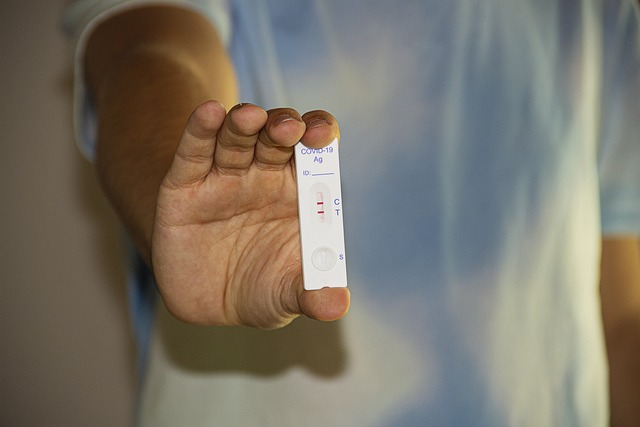Cholesterol blood tests are crucial for maintaining cardiovascular health as they help detect harmful high LDL ('bad') cholesterol levels while monitoring beneficial HDL ('good') cholesterol. Regular screening, often integrated into routine check-ups or accessible through home kits, enables individuals to proactively manage their heart health by understanding their lipid profiles. Early detection facilitates informed lifestyle changes and medical interventions, significantly reducing the risk of heart disease and stroke. Cholesterol blood tests are essential tools for proactive long-term health management.
In today’s focus on proactive healthcare, easy access to cholesterol blood test services plays a vital role in managing your health. Understanding cholesterol levels and their impact is the first step towards making informed decisions. Regular testing is crucial for early detection of anomalies, allowing for timely intervention. This article explores various options for accessing cholesterol blood tests, highlighting the convenience available. We’ll also guide you through interpreting results, empowering you to take control of your cardiovascular health.
- Understanding Cholesterol and Its Impact on Health
- The Importance of Regular Cholesterol Testing
- Accessing Cholesterol Blood Test Services: Options and Convenience
- Interpreting Cholesterol Results: Taking Control of Your Health
Understanding Cholesterol and Its Impact on Health
Cholesterol is a waxy, fat-like substance found in all cells of our bodies. It plays a crucial role in maintaining overall health, helping to build and protect cell membranes, insulate nerves, and produce hormones. However, high levels of cholesterol in the blood can lead to significant health issues. LDL (low-density lipoprotein) cholesterol, often referred as ‘bad’ cholesterol, accumulates in the walls of arteries, forming plaque and narrowing them. This condition, known as atherosclerosis, increases the risk of heart disease and stroke. On the other hand, HDL (high-density lipoprotein) cholesterol, or ‘good’ cholesterol, helps remove LDL cholesterol from the bloodstream, protecting against these risks.
Regularly getting a cholesterol blood test is essential for managing cholesterol levels and maintaining cardiovascular health. A simple cholesterol blood test can measure the amount of LDL and HDL cholesterol in your blood, providing valuable insights into potential health risks. By understanding your cholesterol numbers, you can take proactive steps to improve them, such as adopting a healthy diet, engaging in regular exercise, or consulting with a healthcare professional for personalized guidance on managing cholesterol levels through medication if necessary.
The Importance of Regular Cholesterol Testing
Cholesterol levels are a significant indicator of cardiovascular health, making regular cholesterol blood tests essential for maintaining overall well-being. High cholesterol is often a silent condition, with no noticeable symptoms, which is why routine screening is crucial. It allows individuals to take proactive measures to manage their heart health and mitigate potential risks.
By accessing easy-to-use and convenient cholesterol blood test services, people can obtain vital insights into their lipid profiles, enabling them to make informed decisions about their diet, lifestyle, and any necessary medical interventions. Early detection of elevated cholesterol levels can lead to positive changes that significantly reduce the chances of developing serious health issues related to cardiovascular disease.
Accessing Cholesterol Blood Test Services: Options and Convenience
Accessing cholesterol blood test services has become increasingly convenient, offering a range of options for individuals to monitor their heart health. Many healthcare providers now provide this service, allowing patients to schedule tests during regular check-ups or as part of a comprehensive health assessment. Additionally, there are dedicated diagnostic centers that specialize in cholesterol testing, providing quick and efficient services with minimal appointment waiting times.
These centers often employ advanced technology and skilled professionals to ensure accurate results. Some even offer home collection kits, enabling individuals to take the test in the comfort of their own homes and send the samples for analysis. This flexibility in access ensures that more people can easily incorporate cholesterol testing into their routine healthcare regimen, promoting proactive measures towards better cardiovascular health.
Interpreting Cholesterol Results: Taking Control of Your Health
Understanding your cholesterol levels is a powerful step towards taking control of your health. When you undergo a cholesterol blood test, the results provide valuable insights into your cardiovascular risk. Total cholesterol is measured in milligrammes per decilitre (mg/dL), and optimal levels are below 200 mg/dL. However, it’s not just about the total; the breakdown of LDL (low-density lipoprotein) or ‘bad’ cholesterol and HDL (high-density lipoprotein) or ‘good’ cholesterol is crucial. A balanced ratio indicates a lower risk of heart disease.
Interpretation allows you to make informed decisions. If your results show elevated LDL levels, it might prompt lifestyle changes like adopting a healthier diet, incorporating regular exercise, or quitting smoking. These adjustments can significantly impact your cholesterol profile positively. Remember, early detection and understanding are key; regular cholesterol blood tests become an essential tool in managing your long-term health effectively.
Taking control of your cholesterol levels is a proactive step towards a healthier future. With convenient access to cholesterol blood test services, regular testing has become more attainable than ever. By understanding cholesterol’s impact and interpreting results accurately, individuals can make informed decisions to manage their health effectively. Remember, early detection and awareness are key to preventing cardiovascular issues and promoting longevity. So, why wait? Take the initiative and schedule your cholesterol blood test today.
